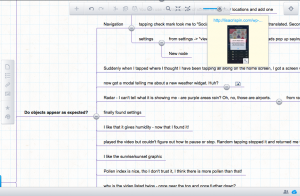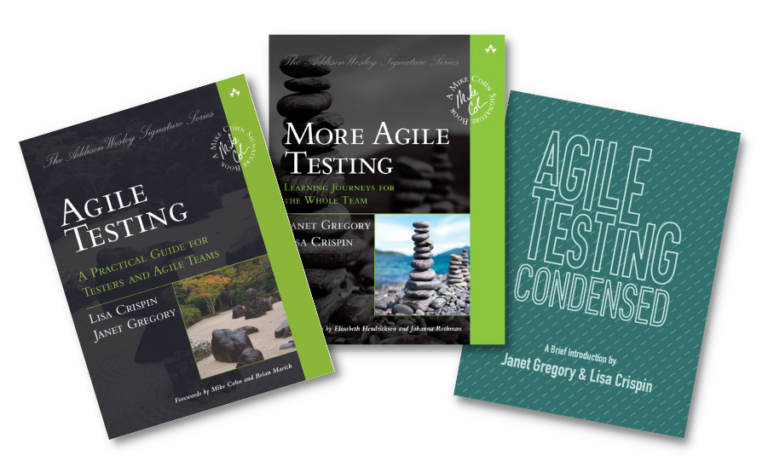I love Weekend Testing and the chance it gives to collaborate with and learn from testing practitioners around the world. However, weekends are my only time to play with my donkeys and catch up with friends and family, so I rarely have time. In past years, I was able to participate in Weeknight Testing Europe, because it happened during my lunchtime, but AFAIK that has kind of died out. However, the first weekend in September was a three day weekend for us in the USA, which gave me the extra time I needed! I followed the instructions from our facilitator, JeanAnn Harrison (whom I’m proud to say contributed to More Agile Testing), which had me frantically draining my iPhone at the last minute by leaving on the LED flashlight plus every app I could open.
Weekend Testing is conducted via Skype chat. The facilitator provides the information about which app to test, what resources are needed (in this case, a mobile device with its battery below 15%), and other information such as a particular charter if applicable. In this case we were to test the Weather Channel phone app, with a focus on usability. The normal format I’ve experienced is one hour of testing followed by one hour of debrief, but this session didn’t follow that format.
Pairing FTW!
I prefer pairing for Weekend Testing, it’s more fun and I learn more. Shanmuga Raja and I agreed to pair, and I suggested we collaborate via a mind map. We didn’t plan that ahead, so we scrambled around and settled on Mind42. I have to say it isn’t my favorite, I prefer MindMeister (paid) and MindMup (free).

Normally I like to use the mind map to plan testing and record results. In this case, though, JeanAnn had already set out a long list of questions to guide our testing, mostly around the usability of the app, and other considerations such as how it affected battery drain. I admit to getting a bit flustered and not following my normal approach. If you click on the full mind map, you’ll see it’s a bit stream-of-consciousness. We (mostly me) recorded our reactions to the usability of the app, what we discovered as we went along, the things that puzzled us, and other information such as the devices we used.
Shanmuga’s Android phone crashed, apparently due to sudden battery drain, which was interesting. My iPhone 6 just steadily lost battery, but it didn’t seem abnormal. Having different devices made pairing especially interesting in this session, and it was fun to compare notes via the mind map.
Insights
I learned plenty from the Skype discussion. For example, I had never really thought about testing to see what an app does to the battery drain rate, though I’ve heard our own mobile developers discuss it. I also learned from JeanAnn that an app can affect the heat level of a device, I had never considered the potential issues from that.
One thing I’m working on right now is learning better ways to help other people learn testing skills. I find it hard to articulate to someone else how I do investigative or exploratory testing. So it was helpful to read the ongoing Skype discussion with comments from JeanAnn, Michael Bolton and others. This inspired me to try a charter, using the format I learned from Elisabeth Hendrickson’s book Explore It!
Explore the different settings for temperature and other metrics to discover whether they display consistently everywhere in the app.
I found an issue with the “hybrid” setting, which was supposed to give Centigrade temperatures but “anglo-saxon” measurements (eg., miles rather than kilometers). After changing to that setting, the app still showed Farenheit temperatures on some views.
Takeaways
After this session, I started using more charters at work, which I’ve found helpful to think about where to focus my testing and what risks could affect our new features. I’m continuing my reading to learn how to transfer testing skills to other team members. On my team, we are hoping to experiment with more tester – programmer pairing and having the developer pairs do more exploratory testing on each story before they pronounce it ‘finished’. Mike Talks has been helpful to me, with his blog posts on learning exploratory testing, and reading suggestions such as “Your Deceptive Mind“. All these ideas and techniques have been around for years, I just haven’t taken the time to make better use of them.
I highly recommend joining a Weekend Testing session. It’s a great way to hone your testing and thinking skills. Just like so many other professions, we need to practice our craft, and it’s harder to practice at work. The inspiration you can get from these sessions is priceless!


3 comments on “Weekend Testing Fun”
There are ways for the mobile app to be designed to monitor and control the hardware and OS conditions like battery & temperature. The temperature is important to monitor because with a phone, it’s a small physical device in comparison to a laptop or even a tablet. One consideration is that the device can shut down to cool rather than burn out the cell modem. It’s too close to the battery physically. If data is sent somewhere else (to a web server) the data can be corrupted. The weather channel app performs differently on a tablet vs a phone. Make sure when the company creates an app for both a phone and tablet, there are comparisons done. Doesn’t always work the same.
It even performed differently on android vs. iOS. So many considerations when hardware is also involved! Thanks again JeanAnn, I have a lot of things to study up on and try.
[…] Weekend Testing Fun – Lisa Crispin – https://lisacrispin.mystagingwebsite.com/2015/09/13/weekend-testing-fun/ […]